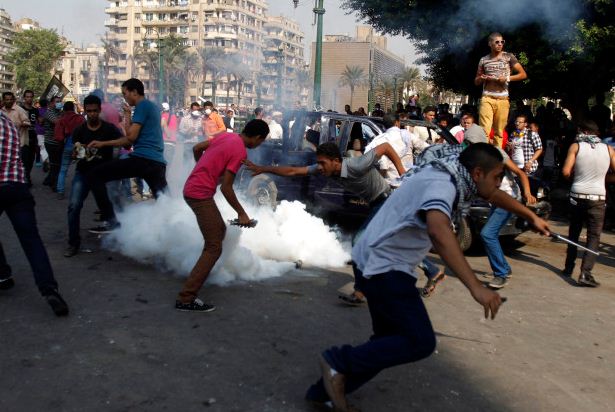by Aidan White
Posted: 18 September 2012
 Protests across the Arab and Islamic world over a provocative anti-Islam film put together by Christian extremists in America is providing fresh ammunition for a targeted political assault on the United States, particularly over its policies in the Middle East.
Protests across the Arab and Islamic world over a provocative anti-Islam film put together by Christian extremists in America is providing fresh ammunition for a targeted political assault on the United States, particularly over its policies in the Middle East.

Some religious extremists, both in the United States and in the Muslim world, are trying to whip the crisis into a violent confrontation between the Muslim world and Western values of free expression similar to the cartoons crisis which erupted in 2005 and the controversy over Salman Rushdie’s book The Satanic Verses more than 20 years ago.
But the street protests this time are more focused on condemnation of American power with rallies and demonstrations centered on embassies and consulates.
At the same time, moderate Muslim voices are trying to lower the temperature, particularly Egyptian President Mohammed Morsi who in a delicate balancing act has called for non-violent protest and says his government will use the courts to sue the makers of the film Innocence of Muslims – the amateurish, low-budget 14-minute trailer that has triggered protests across the Arab and Islamic world.
However, media-savvy extremists such as Hassan Nasrallah, Lebanon’s firebrand leader of Hezbollah, are determined to take political advantage of the crisis.
He used his al-Manar television station to call for a week of protests by Muslims against American embassies.
Nasrallah and others him want governments in the Arab and Islamic worlds to demand an enforceable international law to protect Islam from media ”insults.” Already Lebanon has called for an emergency meeting of Arab foreign ministers.
Nasrallah branded the video an “unprecedented” insult to Islam – even worse, he said, than Rushdie’s novel and the cartoons of the Prophet Muhammad, which were published in a Danish newspaper.
The row over the film Innocence of Islam, which denigrates Islam and the Prophet Mohammed, escalated after armed terrorists in Libya used the demonstrations as a cover for a targeted strike at the US consulate in Benghazi in which ambassador Chris Stevens and three other diplomats were murdered.
In Pakistan, where powerful blasphemy laws are in force, the judges and official censors have been busy shutting down more than 150 web sites after the Supreme Court called for a crackdown on attempts to post the film on the net.
Meanwhile, at the weekend police in California where the film was made have questioned the Christian extremist Nakoula Basserley, the so-called film-maker. He is suspected of other offences.
His production is so bad it has even been disowned by its actors who protest that their dialogue was replaced with badly-dubbed religious hate-speech before it was posted on YouTube.
The role of media in this crisis will be critical, but already it is clear that some lessons of the past have already been learned.
The laughable quality of this latest film means that it meets few of the quality benchmarks for free expression that justify any significant campaign in its defence.
Even well-produced material is used judiciously after the experience of the cartoons crisis in 2006 when more than 150 people died in violent protests around the world after the publication of controversial cartoons of the Prophet Mohammed by the newspaper Jyllands Posten. The latest confrontation is making headlines, but the violence has not been spread as 6 years ago. So far has led to 18 deaths.
Media have learned to tread carefully in dealing with potentially explosive material particularly when it is designed to provoke confrontation.
The Dutch right-wing politician Geert Wilders, for instance, found few media takers ready to broadcast his provocative anti-Islam film Fitna two years ago and he was banned from Britain when he tried to show it.
Lack of public support and the media focus on his Freedom Party’s politics rather than the film controversy he tried to create may also explain his party’s collapse in recent elections in The Netherlands.
And media have learned to beware of being manipulated by loud-mouthed publicity-seekers. An unknown Christian fundamentalist from the backwoods of Florida, Pastor Jim Jones, became a global media sensation when he announced his intention to publicly burn the Koran.
Major media later admitted that it may have been a mistake to give prominence to this man whose church and congregation amounted to a handful of followers. But he is still thriving on that initial exposure and was one of the people backing the latest film.
For journalists this new crisis highlights the importance of maintaining an ethical balance between defence of free expression and the right of people to speak freely.
When politics and extremism are put into the mix journalists have to beware of the dangers in taking sides on issues which touch cultural nerves on all sides.
Initiatives to promote dialogue among media people from different cultural traditions as supported by the MDI and others have proved useful in the past and are needed now more than ever.

